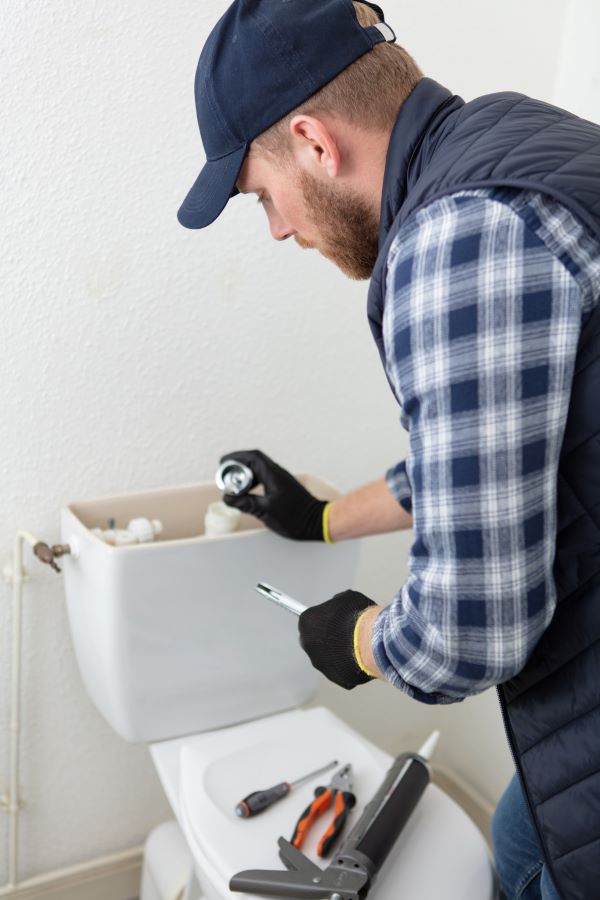Plumber in Cottonwood
At Mountain High Plumbing, we have been gratefully and proudly serving our neighbors in Cottonwood since 1994. Our family-owned plumbing company comes from humble beginnings, starting with Jim Velez, Sr. and his wife, Alana starting the company nearly 30 years ago and their son, Jimmy later joining the family business. Both Jim Sr. and Jimmy offer their own unique skill sets, allowing each customer to get the finest service each and every time they call our family-owned, local business. Mountain High Plumbing makes customer satisfaction our top priority.Our Cottonwood plumbing company has maintained a commitment to excellence from the very start, and this dedication has played a significant role in establishing our outstanding reputation. We offer top-tier workmanship backed by extensive experience, and our competitive pricing further sets us apart from the competition. Our team includes bonded, insured, and licensed plumbers known for their trustworthiness and dependability. Including only committed, knowledgeable, and diligent individuals, we are confident that you will find their service unmatched. Give our Cottonwood plumbing service a call today and we’ll be happy to show you firsthand exactly what makes us the premier plumbing business in Northern Arizona.
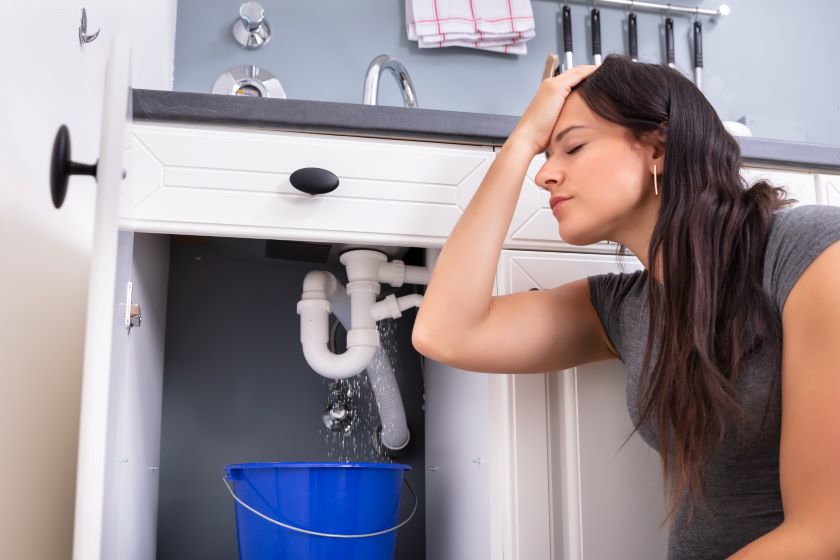
Dealing with Kitchen Problems
If any of these scenarios sound familiar, let's look into the possible causes.My kitchen faucet is leaking.
Many kitchen faucets use a single-valve cartridge to manage the flow of both hot and cold water. If your faucet is dripping, you may need to replace this cartridge.My sink is draining slowly.
Since kitchen drains are commonly obstructed by food debris, foreign items, grease, or soap scum, your skilled plumber might need to use a plumbing snake to clear the blockage after opening your drain trap.There is a leak in the cabinet under my kitchen sink.
This kind of leak often stems from a faulty joint in the drain pipe. We've also witnessed cases where water supply connections fail, causing a leak. Human error can also be a contributing factor, especially when hand-tightened fittings at the connection points between water supply pipes and faucets aren't properly secured. If your seals or caulking are worn or defective, splashed water might also leak into the cabinet below. Count on us to help you diagnose and address any of these common issues.How can pipes be insulated?
Considering the individual plumbing layout of each home, your plumbing contractor will initiate the assessment by identifying the best approach for insulating your pipes. This often entails the selection of appropriate insulating materials, which might involve heat cables or heat tape, specifically for safeguarding pipes situated in crawl spaces, unheated attics, or exterior walls. By calling our plumbing service in Cottonwood and implementing these solutions, your pipes will be well-prepared to endure cold temperatures, reducing the risk of freezing or bursting.
My pipes are frozen - what do I do?
If your pipes are frozen, the first step is to immediately shut off your main water valve. Then, you have two options: you can contact Mountain High Plumbing for assistance, or you can attempt to thaw them on your own. However, if your water meter has frozen, contacting your water company is your only choice due to the potential for severe damage. To prevent a costly and extensive plumbing repair, it's crucial to take a proactive and practical approach.
How can I thaw my frozen pipes?
Prior to embarking on the task of thawing your own pipes, it's vital to recognize the associated risks, which include potential melting or cracks if pipes are overheated, the risk of water damage, and other concerns. If you find yourself uncertain about your ability to safely thaw the pipes or if you suspect that a pipe may have already cracked or burst, we strongly urge you to contact our 24/7 plumber immediately at (928) 774-3593. You may also consider attempting the recommendations outlined below, but if these methods fail to resolve the plumbing problem, it is advisable to contact our emergency plumber. Mountain High Plumbing is fully prepared to offer our assistance during your time of need.- Talk to your neighbors. You can suspect a water main break (rather than frozen pipes) if they have the same issues.
- Shut off the water by turning off the main supply.
- Open every faucet.
- Warm pipes with a blow dryer, but carefully avoid anything flammable.
- Slowly turn the water supply back on and evaluate the situation. Check for pooled water (which is an indicator of a burst or cracked pipe), leaks, and/or cracks.
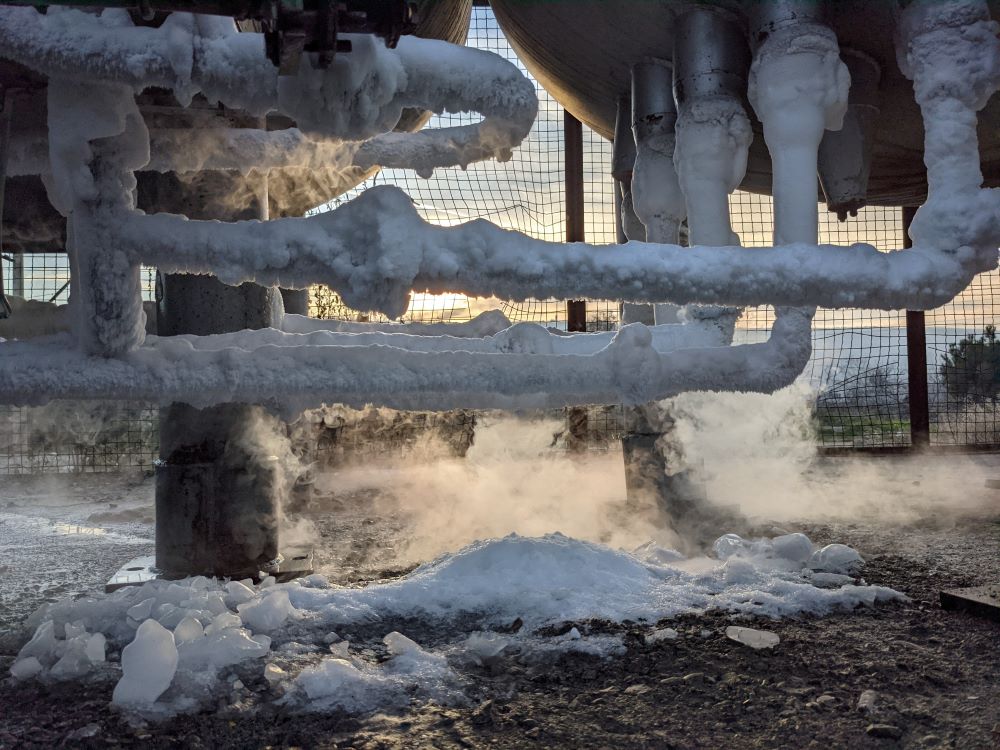
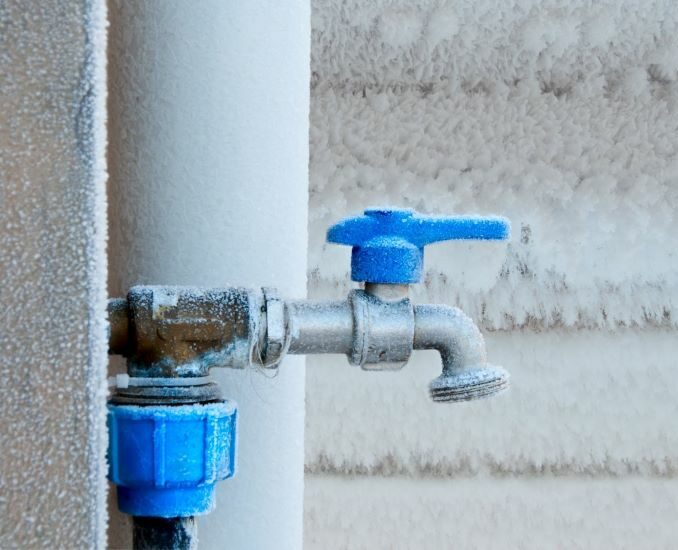
Dealing with Frozen Pipes
What proactive steps can prevent frozen pipes?
Some precautions can considerably reduce the likelihood of frozen pipes and the problems they can cause. To keep pipes warm, our insured plumbers recommend leaving under-sink cabinet doors open and maintaining an indoor temperature of 55 degrees or above. Turn off exterior spigots and drain the lines before freezing weather arrives. Use your faucets on a regular basis and allow a small stream of cold water to run from a distant faucet to keep circulation going. It's also a good idea to talk to your plumber about insulating your water lines and tank. You can keep your plumbing in good working order during the winter by keeping these tips in mind.When and where might my pipes freeze?
Pipes are most susceptible to bursting when exposed to prolonged low temperatures, with the potential for bursting even after just six hours of freezing. The greatest risk arises when temperatures fall below 20 degrees, but pipes can start freezing at temperatures below 32 degrees. These incidents are most common in locations such as crawl spaces, attics, or exterior walls.All About Whole Home Water Filtration
For the sake of safety, city water undergoes treatment methods such as pre-filtration, activated carbon, and copper-zinc KDF treatment. Home water filters play a vital role in eliminating impurities like chemicals, heavy metals, and hard minerals. Filtered water not only promotes better health, but also extends the lifespan of your plumbing, faucets, and appliances.
A whole-house water filtration system is a smart decision that comes with numerous advantages. It ensures the availability of safe, delicious drinking water, alleviates concerns about contaminants, and reduces expenses on bottled water, all while helping to cut down on plastic waste. Moreover, the filtration system helps prevent limescale and mineral buildup, minimizing the risk of plumbing problems and expensive repairs. Bid farewell to skin irritations, reduce soap consumption, and enjoy cleaner, softer clothing. In essence, investing in a whole-house water filtration system not only enhances your quality of life, but also demonstrates environmental responsibility, all within a budget-friendly framework.
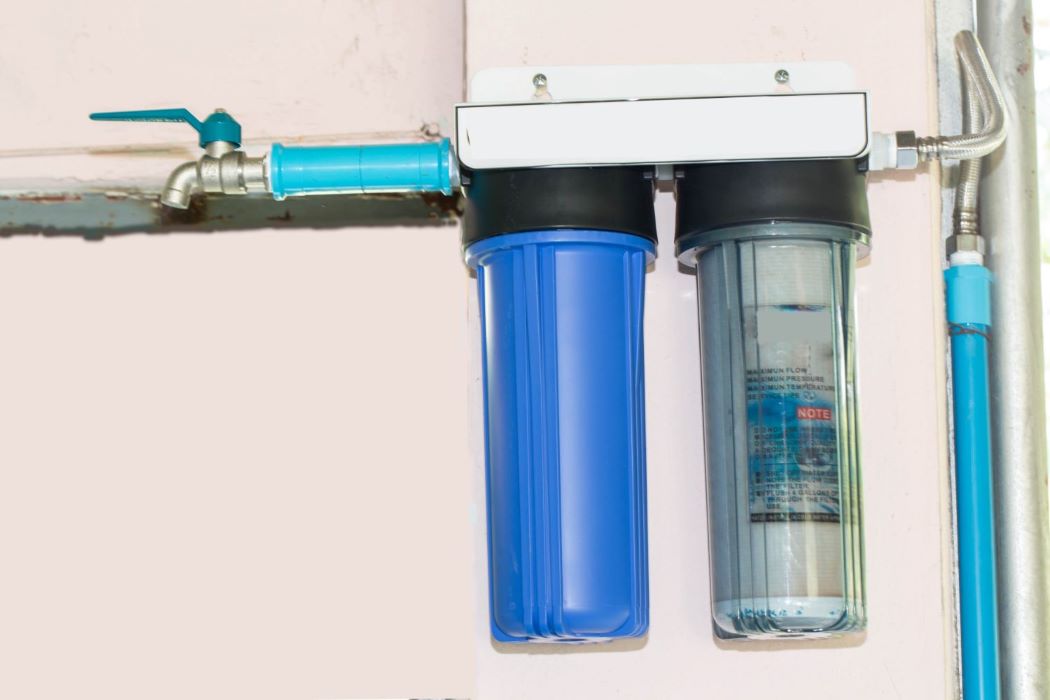
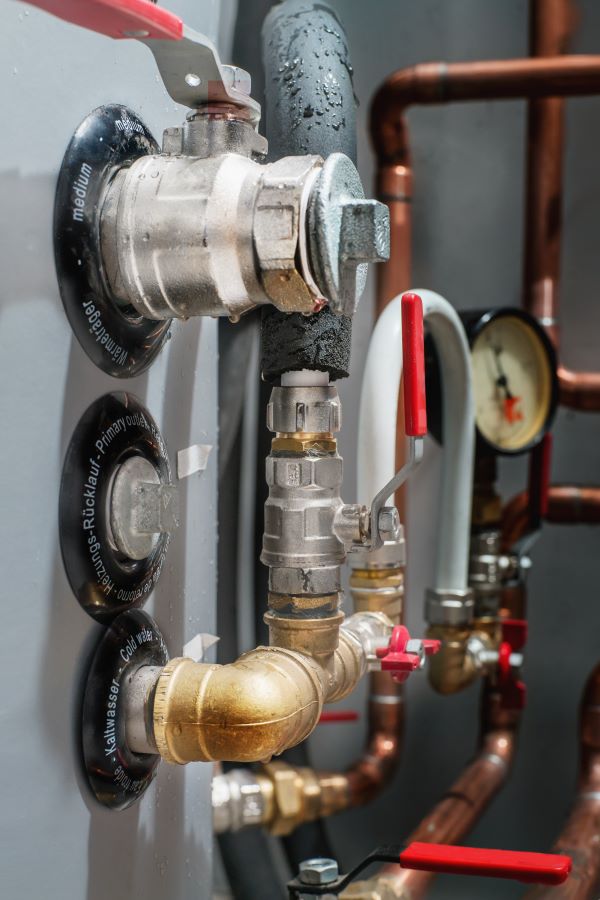
All About Gas Piping
Gas piping systems transport natural gas to a property using pressure. Natural gas moves through a network of pipes from areas with higher pressure to locations of lower pressure. It goes through a pressure regulator, enters the distribution system, and eventually arrives at your home. This journey starts at the mainlines, and while it flows through a service line, it's owned by the gas utility companies. However, everything downstream (on your property) is your responsibility. When you operate a gas stove or furnace, the gas pressure slightly surpasses the air pressure, enabling the heating unit to ignite. The most common gas piping materials are:PVC
Plumbers often choose PVC gas pipes due to their affordability, but their use is restricted in some regions due to the risk of breakage during installation. Nevertheless, they remain a cost-effective option for underground exterior pipelines thanks to their corrosion resistance and impressive durability.HDPE
Although this material is often harmed by natural, subsurface objects such as pebbles or tree roots, the plastic lines are flexible and inexpensive. HDPE, like PVC, has shown to be a dependable alternative for buried outside pipeline applications.Black Iron
This material is the preferred option for both indoor and outdoor gas pipelines. Its durability, strength, and resistance to heat ensure a reliable and airtight seal. Nonetheless, black iron is prone to corrosion over time, and the sealant applied to it can deteriorate. If your gas system relies on this material, regular maintenance is strongly recommended.Flexible Corrugated Stainless Steel Tubing
Easy to set up, flexible corrugated stainless steel tubing is better suited for indoor gas piping tasks due to its increased susceptibility to cracking. These bendable tubes offer significant benefits in tight spaces and areas prone to disasters.Galvanized Steel
Galvanized steel is less popular in current construction and is mostly seen in older buildings due to the substantial labor needs. It is a strong and energy-efficient piping material that is commonly used for water supply and both interior and exterior gas lines.Copper
Notably, some municipalities have entirely prohibited the use of copper pipes. They have an average lifespan of about two decades and are subject to stringent code rules that limit their use in a variety of regions.The Top 5 Most-Used Plumbing Pipe Materials
PVC Pipes
PVC piping is a common choice over galvanized steel pipes due to its durability and cost-effectiveness. This sort of piping is commonly used for waste lines and is a popular material choice, but it cannot withstand highly pressurized water.Copper Pipes
Copper pipes, recognized for their chemical resistance, incredible longevity, and ease of cutting, are frequently used in household fixtures like tubs, sinks, and showers - albeit at a higher price compared to other options. They are commonly used for household water lines.PEX Pipes
PEX piping comes in three distinct colors, each tailored for a particular role: white for water of any temperature, blue for cold water, and red for hot water. Our proficient local plumbers favor PEX piping for its outstanding durability, adaptability, and flexibility, making it suitable for a wide array of applications. It's also known for its rigidity, affordability, and expandability, providing a cost-effective solution for diverse plumbing needs.Cast Iron Pipes
This type of piping material is now considered outdated due to several disadvantages, including its susceptibility to corrosion, propensity for causing sewer backups, frequent issues that can be costly for homeowners, and gradual deterioration. While it was once a common choice valued for its practicality, damage resistance, and durability, our plumbers near you often come across it in sewer drain lines of homes built during the '70s and '80s.CPVC (Chlorinated Polyvinyl Chloride) Pipes
CPVC pipes have some limitations. They cannot withstand high temperatures, making them unsuitable for places with temperature variations. Their brittleness adds to their disadvantages, and they cost roughly twice as much as normal PVC equivalents. Despite these drawbacks, this long-lasting and robust polymer is non-corrosive and easy to install, outperforming copper piping in certain areas.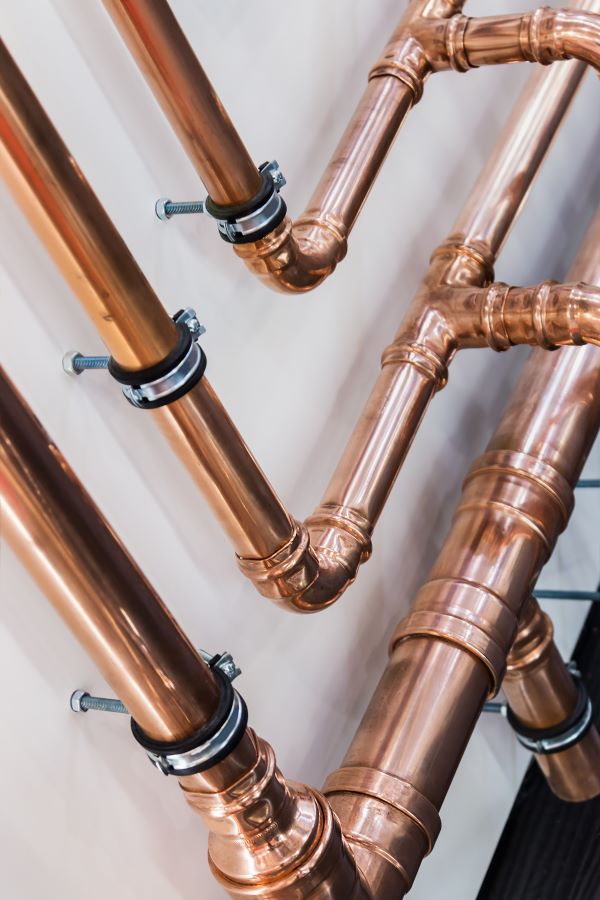
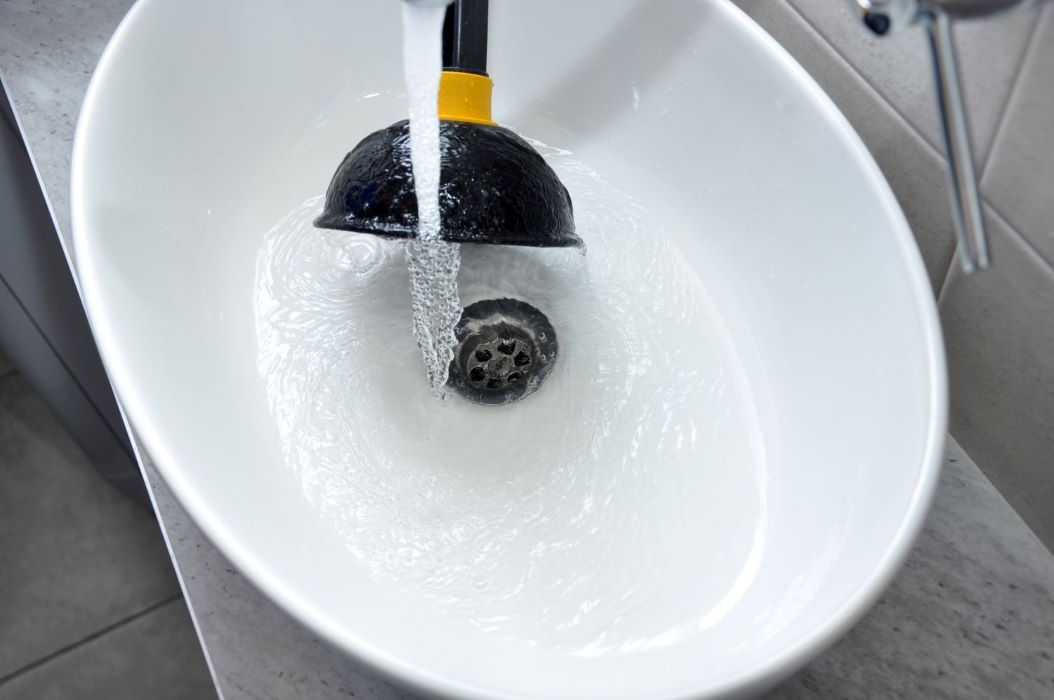
Dealing with Bathroom Sink Problems
There are a number of common sink-related issues, and many of the following statements may pertain to homeowners facing these issues.My faucet is dripping.
This issue is often caused by a damaged washer, general wear and tear, a faulty valve seat, a defective o-ring, or corrosion. Our experts will quickly pinpoint the problem's source and carry out the necessary repairs.My drain stopper isn't functioning properly.
Stoppers play a crucial role in enabling your drain to open and close effectively. If the stopper has a loose nut or is damaged, it will not operate correctly and should probably be replaced.My sink caulking is coming off.
Caulking around sinks can peel, develop mildew, mold, or crack due to prolonged exposure to water. We recommend that you re-caulk every five years.There's an unpleasant odor coming from my sink.
If you detect a foul, rotten egg-like odor, it's probable that a microbial infection has developed in either the sink overflow passage or the drain. Typically, you can address these infections with a 3% hydrogen peroxide solution. Should the odor persist, please reach out to us for further assistance.My drain is clogged or slow.
First, inspect your drain stopper to see if there is any buildup on the horizontal pivot rod beneath the drain opening. If the stopper looks okay, the obstruction is most likely caused by soap scum or hair. For diagnostics and repairs, you'll want to contact Mountain High Plumbing.Dealing with Water Pressure Problems
If any of the following circumstances apply to you, continue reading to learn more about the potential causes of your low water pressure.Neighboring homes or businesses have the same water pressure problem I’m experiencing.
If this is the case, there is likely an issue at the level of your water supplier. Reach out to your water company to report your concerns.I’ve noticed wet spots or pooled water on my property.
Leaking pipes redirect water and result in reduced water pressure, so when you observe these symptoms, it's a clear indication to reach out to Mountain High Plumbing before the issue deteriorates.My area has changed the local water pressure regulations.
If you've already discussed changes in water regulations with your water supplier and identified them as the cause, it's a good idea to consult with your plumber about installing a water pressure booster. Before installing your booster system, we'll thoroughly inspect your plumbing to guarantee there are no other issues.I’m only noticing a water pressure issue with a single fixture in my home.
If you're experiencing low water pressure in just one faucet or fixture, the issue likely originates from that specific fixture. A skilled plumber may need to clear any buildup or obstructions, or in some cases, replacing the faulty fixture might be necessary.My home has old pipes.
Corrosion is the most likely cause of a water pressure problem if your galvanized steel piping is more than 20 years old, copper piping is more than 50 years old, or brass piping is more than 40 years old. We'll need to inspect your pipes and replace some of them if need be.My water pressure regulator has no reading or seems inaccurate.
Consider using a water pressure gauge to see your exact water pressure reading. If the regulator and gauge do not have the same reading, or if the regulator has no reading at all, the regulator is most likely faulty. Don't hesitate to reach out to your trusted professional at Mountain High Plumbing for assistance in diagnosing or replacing your pressure regulator.None of these statements apply to me, but I still have low water pressure.
If you've gone through all the checks you can think of and are still experiencing water pressure problems, it's possible that your water meter valve or the main house shutoff valve isn't fully open. The water meter valve, typically owned by your local water utility, controls the water flow into your property. The main house shutoff valve, usually near the city supply pipe in your home, also plays a key role. If the main shutoff isn't the issue, contact the city to have your water meter valve inspected.
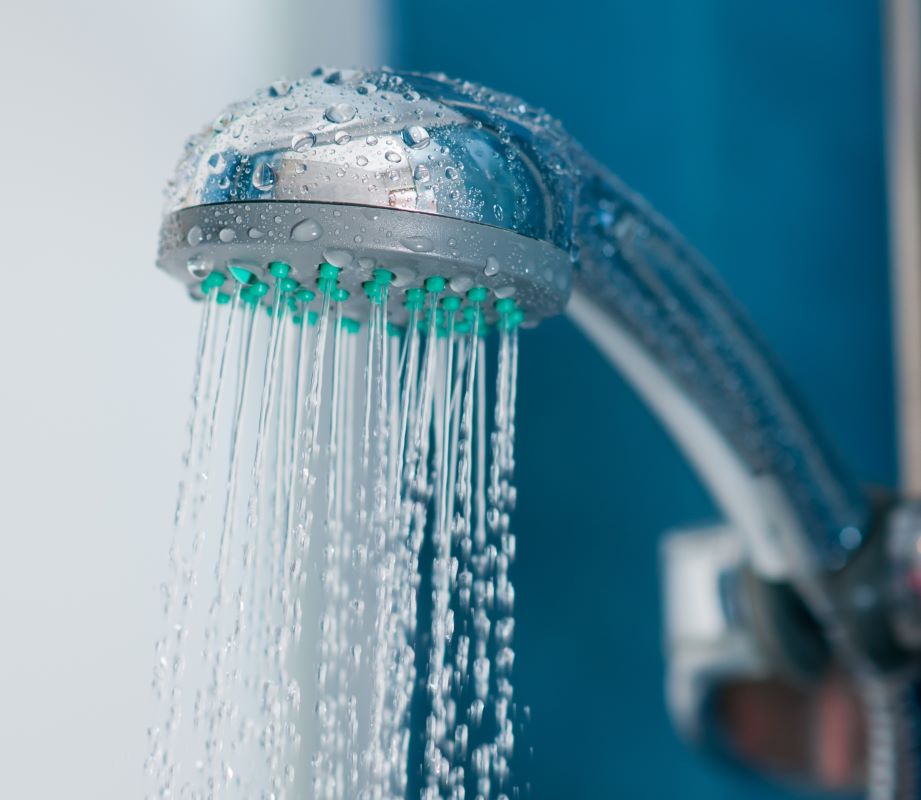
Dealing with Shower Problems
If you find any of these situations relatable, continue reading to discover the probable underlying reasons.My shower drain is clogged.
Shower drains can often become clogged due to things like soap scum, foreign objects, hair buildup, or potentially more serious problems such as damaged pipes. Our plumbing experts strongly discourage the use of drain cleaning chemicals, as they can exacerbate the situation. Instead, you can attempt to clear the blockage using a plastic drain cleaning tool. If your own attempts don't prove successful, our team can step in with professional tools to assist you.My shower head is dripping.
Magnesium, lime, silica, calcium, and other minerals accumulate in hard water. These deposits can clog your shower head and are often accompanied by visible white lines. This problem might be solved by soaking the shower head in vinegar. Shower head issues, on the other hand, might be caused by faulty gaskets. We are always available to assist you with gasket replacement or any other shower head-related task.My shower drain is stinky.
Bathrooms that are rarely used may smell because gas starts escaping from the shower drain P-trap when it is dry. In bathrooms used regularly, the problem could be related to sewer gas, mold, or bacteria. We can help you move past this unsettling issue quickly and easily.Dealing with Toilet Problems
Our local plumbers in Cottonwood are pleased to offer their professional guidance on dealing with some of the most commonly-encountered toilet issues.My toilet is running continuously.
A potential cause of this issue could be a flush valve leak at the base of the toilet tank or a malfunctioning fill valve.I have a water supply leak.
A persistent uptick in water bills, noisy pipes, the presence of pooled water, or diminished water flow are telltale signs of this issue. After turning off your water supply, contact our plumbing service to assist you in avoiding major and severe problems.Water is leaking at the point where the toilet tank and bowl meet.
If you observe this issue, your plumber will be required to drain the tank, detach it, and replace a gasket.My toilet is overflowing.
If you encounter this problem, don't hesitate to reach out to Mountain High Plumbing for our swift plumbing services. Locate and turn off any valves connecting the toilet pipe to the tank. If no such valve is present, simply shut off your water supply until our arrival. This issue indicates a plumbing vent obstruction, a full septic tank, a sewage concern, or a significant pipe blockage.I need a new toilet installed.
Our experienced plumbers handle toilet installations regularly. First, we'll remove your old toilet. After checking the flange and adding a new wax ring, we'll position the new toilet, secure it with bolts, and attach the seat, tank, and lid. If your toilet has special features, like bidets or electrical components, we'll make sure to install those too. We won't call it a day until we've tested for leaks and confirmed everything is set up correctly. Whether you want a dual-flush, double-cyclone, pressure-assisted, two-piece, comfort-height, gravity-fed, wall-hanging, one-piece, or waterless toilet, you can count on us for expert installation.My toilet is clogged or flushes slowly.
Start by attempting to clear the clog with a plunger. If a standard plunger doesn't work, a complex clog might necessitate the use of a plumbing snake by a professional plumber. Over time, as toilets accumulate debris, rust, calcium, or lime deposits, their flushing efficiency may decrease. In such cases, your Cottonwood plumbing contractor can resolve the issue by installing a new toilet.There is a leak around the base of my toilet.
If you are seeing water accumulate around the base of your toilet as the day wears on or right after you flush, there is probably a problem with your wax ring. We'll need to drain the toilet tank, remove the whole toilet, and swap out this ring, whether it's poorly fitted, worn, or malfunctioning. In more severe cases of leakage, you might need to install a new tank and toilet.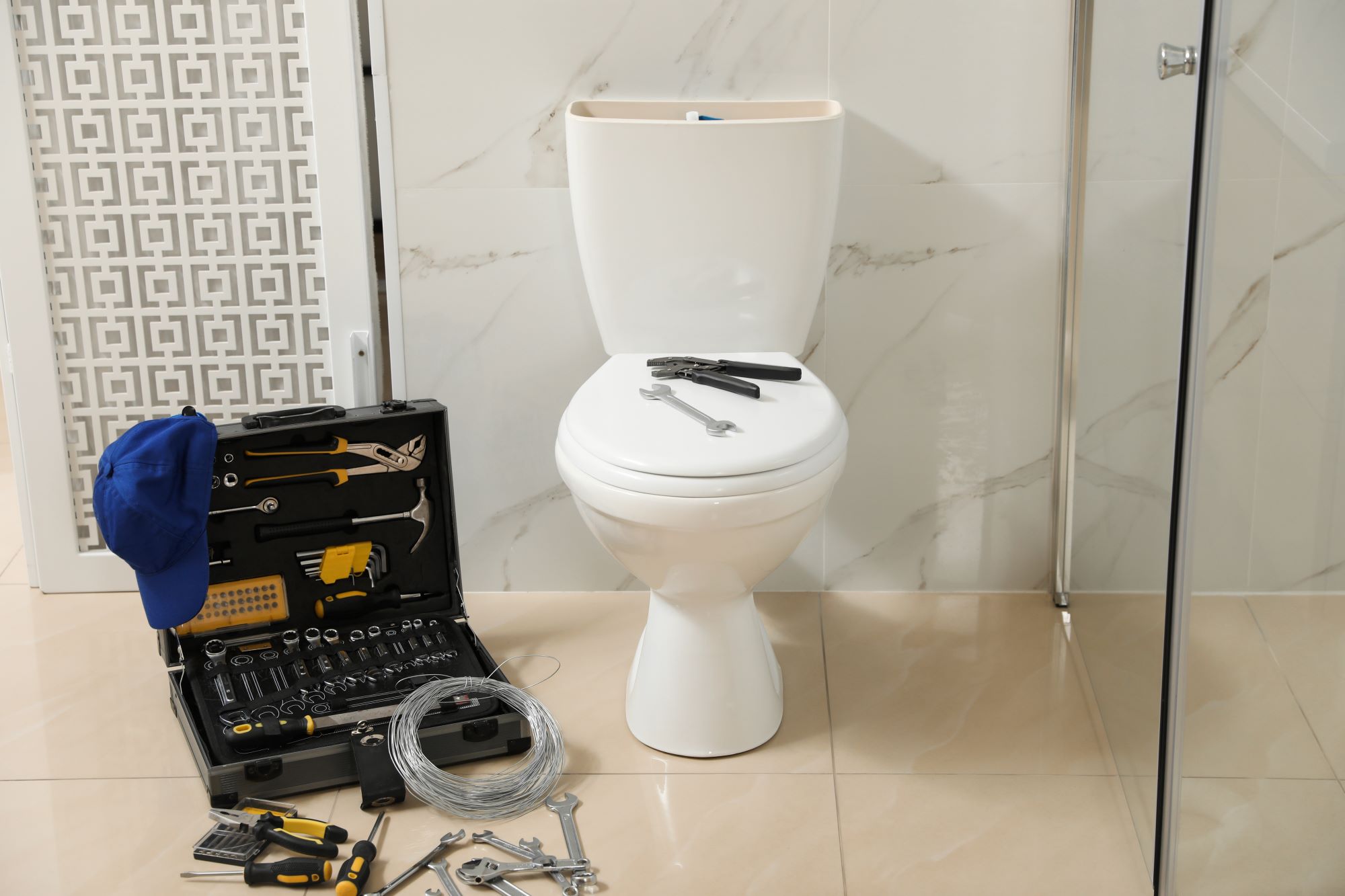
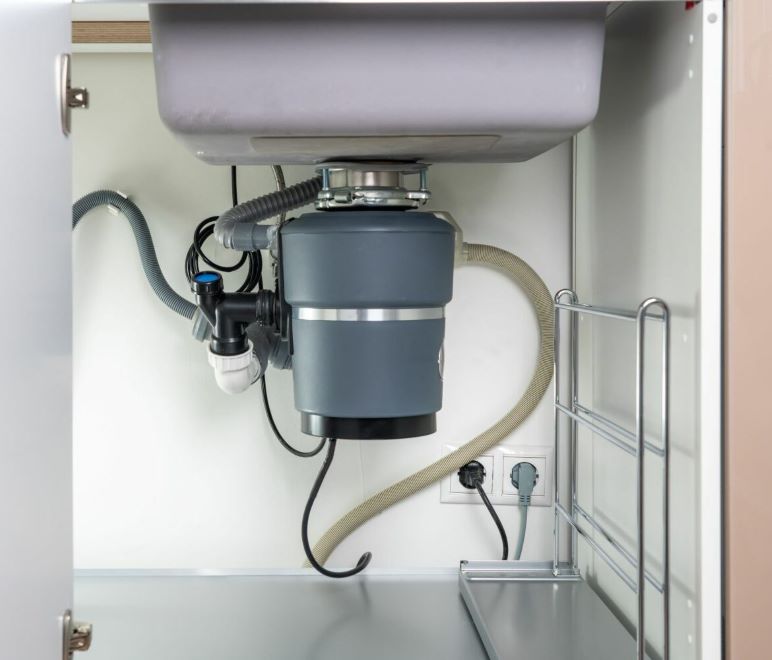
Garbage Disposal Installation
Here's the procedure our proficient plumbers follow for installing garbage disposals:- Turn off the circuit breaker and handle electrical wiring with care.
- Install the drain flange.
- Mount the ring and gasket.
- Provide support for the disposal and secure it into place.
- Use pipe connectors to fasten the discharge pipe (P-trap) to the disposal outlet.
- Confirm that all fasteners at the plumbing and mounting connections are securely tightened. Check for any leaks by operating the disposal and faucet.
The Power of Hydro Jetting
Hydro jetting is a revolutionary technique that involves using a high-pressure, unique water hose to cleanse a plumbing system thoroughly. The process initiates with an initial evaluation, employing a specialized camera to identify any pipe damage that might impede our ability to hydro jet your system. We'll start the hydro jetting service once we've confirmed that your system is devoid of damage. This entails the expert positioning of the high-pressure hose and connecting it to a professional-grade water tank. Ensuring the ideal insertion point for the hose is a painstaking procedure that should never be skipped.
With a powerful surge of water pressure, our durable hose, and the force of gravity working in harmony, we spring into action. This dynamic collaboration propels water through the system at an impressive rate of around 20 gallons per minute. The water rushes through backward-facing jets, propelling the nozzle through the pipes, while a forward-facing jet further assists in dislodging debris. Hydro jetting is not limited to tackling clogs alone - it provides a comprehensive solution for eliminating grease, tree roots, mineral buildup, and any potential debris that could lead to future issues. When confronted with a particularly stubborn blockage, your dependable plumbing professionals are likely to recommend this method for the most effective results.
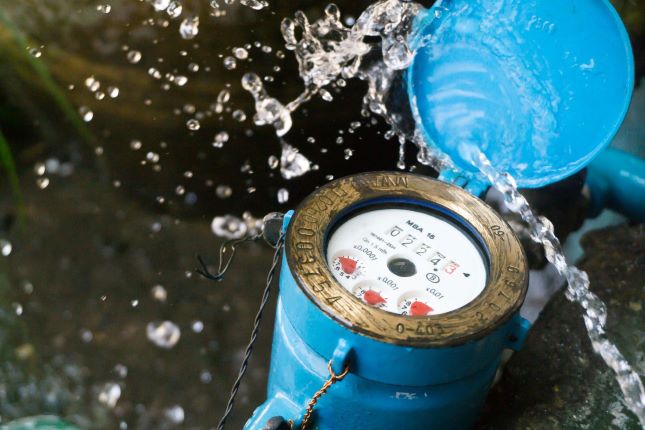
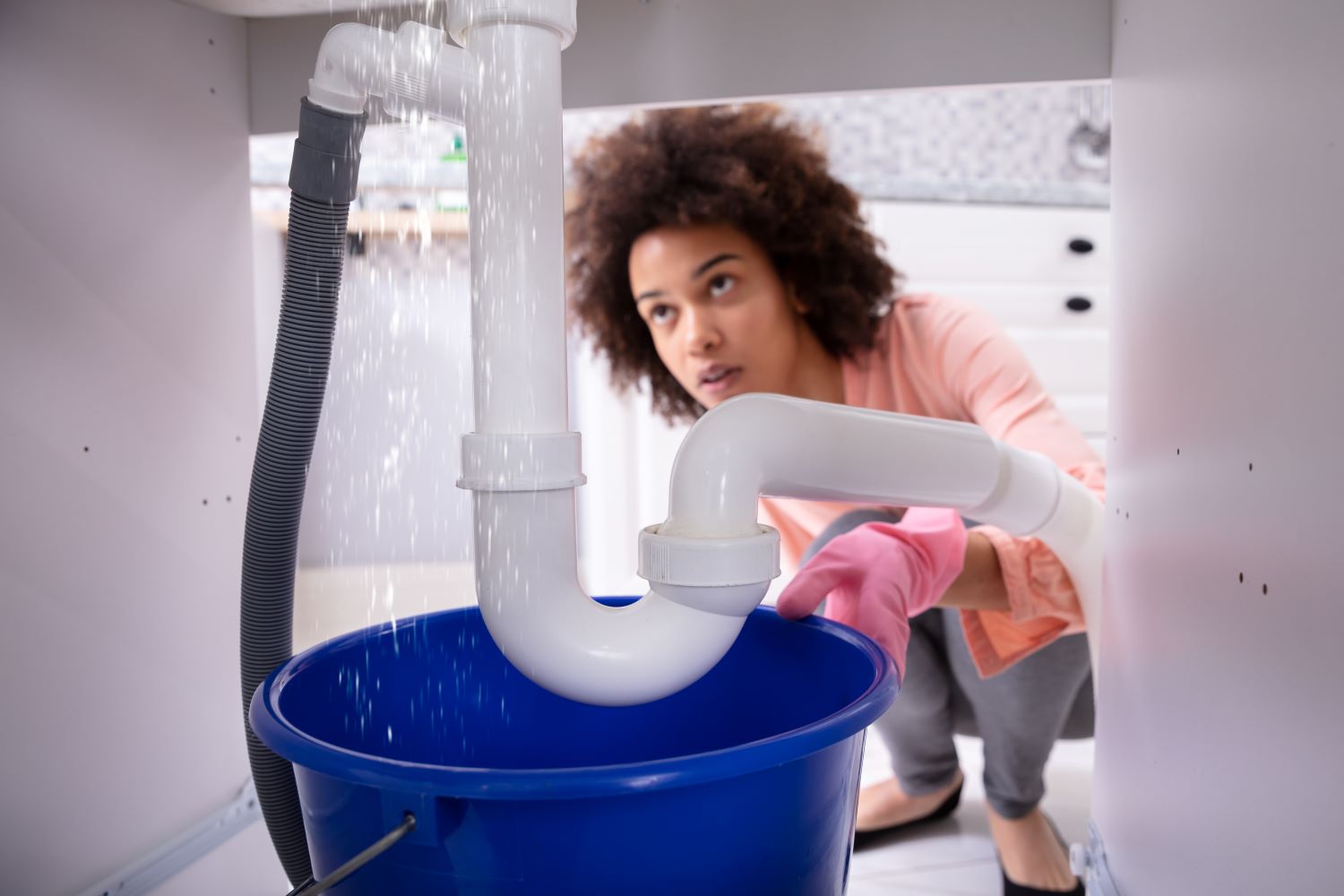
Dealing with Pipe Leaks
If any of the scenarios sound familiar, continue reading to find out why.I notice a banging or ticking sound coming from my pipes, especially when I'm running hot water.
Pipe joints include multiple components and are exposed to continuous water flow, which makes damage to these joints relatively common. Issues can arise from factors like high water pressure, aging, and extreme temperatures, often requiring the replacement of these joints.I have a sudden, extensive, and emergent pipe leak.
Not all plumbers are created equally, and the unfortunate reality is that poorly installed pipes can cause significant issues for homeowners. Every pipe and connector should be precisely and meticulously installed by a professional, like those at Mountain High Plumbing. Reach out to us at (928) 774-3593 for 24-hour emergency plumbing services, and we'll help you resolve this messy and potentially disastrous situation.I have a water leak in conjunction with a running toilet, damaged appliances, and/or a high water bill.
Pipes are constructed to withstand various forms of stress, but elevated water pressure can result in leaks or even pipe bursts. To either preempt or eliminate a problem, our diagnostic testing will involve assessing your household's water pressure.Water is pooling near my appliance(s).
If condensation forms on the appliance, the most likely cause is fracture or deterioration of the rubber sealant surrounding the equipment's connections. If the problem is accompanied by water leaking from the supply line, the water connectors from your appliance to your water supply are most likely damaged or loose due to wear and tear or shifting. These causes can be difficult to diagnose on your own, so contact Mountain High Plumbing for assistance.My water drains slowly or I have noticeable water supply issues.
Nature is unpredictable, and earthquakes, floods, and other disasters cause the ground to move and shift. Consequently, pipes can bend, separate, twist, or crack. When such events arise, thorough plumbing inspections and repairs will be essential.My water tastes bad, smells bad, or has noticeable discoloration.
Galvanized steel pipes typically have a lifespan of around 20 years, while brass pipes can last for approximately 70 years. As pipes and plumbing components age, they deteriorate, corrode due to pH imbalances or mineral buildup, or start to rust. That's why it's crucial to reach out to your trusted plumbing expert for assistance.I have tree roots growing close to my home, an extreme drop in water pressure, and/or a sinkhole or wet areas in my yard.
The intricate root systems of trees are known to disrupt household water lines. Plumbers must conduct comprehensive pipe inspections and promptly address any invasive root issues.My toilets are overflowing, drains are clogged, or pipes have burst but aren’t frozen.
A variety of substances, such as debris from gutters, chemicals, hair, and an obstruction in the air handler drain pan, can lead to blockages in your plumbing lines. These severe clogs can result in major, time-sensitive plumbing issues.I can see damage to my fixtures or pipes.
When a fixture is physically impacted, it can crack, necessitating immediate repairs.